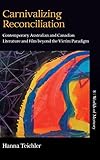Carnivalizing Reconciliation : Contemporary Australian and Canadian Literature and Film beyond the Victim Paradigm / Hanna Teichler.
Material type: TextSeries: Worlds of Memory ; 8Publisher: New York ; Oxford : Berghahn Books, [2021]Copyright date: ©2021Description: 1 online resource (274 p.)Content type:
TextSeries: Worlds of Memory ; 8Publisher: New York ; Oxford : Berghahn Books, [2021]Copyright date: ©2021Description: 1 online resource (274 p.)Content type: - 9781800731721
- 9781800731738
- Australian literature -- 21st century -- History and criticism
- Canadian literature -- 21st century -- History and criticism
- Indigenous peoples in literature
- Indigenous peoples in motion pictures
- Memory in literature
- Memory in motion pictures
- Motion pictures -- Australia -- History -- 21st century
- Motion pictures -- Canada -- History -- 21st century
- Victims in literature
- Victims in motion pictures
- Victims -- In motion pictures
- SOCIAL SCIENCE / Indigenous Studies
- Memory Studies, Literary Studies, Film and Television Studies
- 820.9/35299915 23/eng
- PN1995.9.I49
- online - DeGruyter
| Item type | Current library | Call number | URL | Status | Notes | Barcode | |
|---|---|---|---|---|---|---|---|
 eBook
eBook
|
Biblioteca "Angelicum" Pont. Univ. S.Tommaso d'Aquino Nuvola online | online - DeGruyter (Browse shelf(Opens below)) | Online access | Not for loan (Accesso limitato) | Accesso per gli utenti autorizzati / Access for authorized users | (dgr)9781800731738 |
Browsing Biblioteca "Angelicum" Pont. Univ. S.Tommaso d'Aquino shelves, Shelving location: Nuvola online Close shelf browser (Hides shelf browser)
Frontmatter -- CONTENTS -- ACKNOWLEDGMENTS -- INTRODUCTION Carnivalizing Reconciliation -- Chapter 1 JUSTICE THROUGH STORYTELLING? Australian and Canadian Reconciliation and the Victim Paradigm -- Chapter 2 CARNIVALIZING RECONCILIATION Beyond the Victim Paradigm -- Chapter 3 BEYOND THE PARTISAN DIVIDE Transcultural Recalibrations of National Myths in Joseph Boyden’s Three Day Road and Gail Jones’s Sorry -- Ch apter 4 “DOUBLE VISIONS” Intimate Enemies and Magic Figures in Kim Scott’s Benang and Tomson Highway’s Kiss of the Fur Queen -- Chapter 5 FROM VICTIMOLOGY TO EMPOWERMENT? Zacharias Kunuk’s Atanarjuat and Baz Luhrmann’s Australia -- CONCLUSION Fictions of Reconciliation -- BIBLIOGRAPHY -- INDEX
restricted access online access with authorization star
http://purl.org/coar/access_right/c_16ec
Transitional justice and national inquiries may be the most established means for coming to terms with traumatic legacies, but it is in the more subtle social and cultural processes of “memory work” that the pitfalls and promises of reconciliation are laid bare. This book analyzes, within the realms of literature and film, recent Australian and Canadian attempts to reconcile with Indigenous populations in the wake of forced child removal. As Hanna Teichler demonstrates, their systematic emphasis on the subjectivity of the victim is problematic, reproducing simplistic narratives and identities defined by victimization. Such fictions of reconciliation venture beyond simplistic narratives and identities defined by victimization, offering new opportunities for confronting painful histories.
Mode of access: Internet via World Wide Web.
In English.
Description based on online resource; title from PDF title page (publisher's Web site, viewed 25. Jun 2024)









